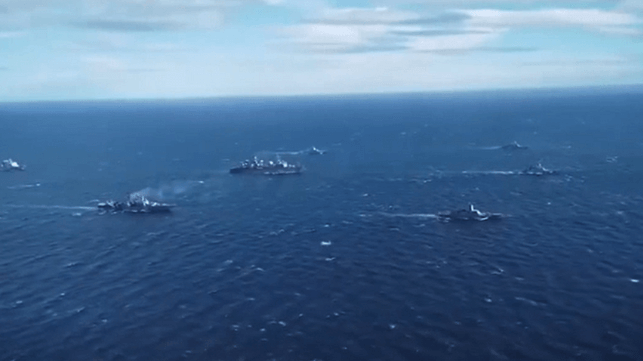Russia and China Hold N. Pacific Naval Drills as Leaders Meet

The Russian and Chinese navies have joined forces for a series of drills in the Pacific, coinciding with a meeting between their top political leaders in Samarkand.
As Russian President Vladimir Putin met with his Chinese counterpart, Xi Jinping, the Russian Navy and the PLA Navy met in the Sea of Okhotsk and the Pacific to conduct exercises. The mission is the latest in a series of Russo-Chinese maneuvers in waters around Japan, an American ally and an opponent of Russia's war in Ukraine.
The goal of the drill is to "strengthen naval cooperation between Russia and China, maintain peace and stability in the Asia-Pacific region, monitor coastal waters and protect Russian and Chinese maritime [interests]" Russia's ministry of defense said in a statement.
The drill is the latest in a series of maneuvers by Chinese and Russian vessel in waters around Japan. In October 2021, the two nations dispatched an unprecedented joint patrol around and between Japan's home islands. China's PLA Navy has regularly circled Japanese territory over the intervening months, including an overt "show of force" in June.
Joint northern presence
With Russia's war in Ukraine encountering setbacks, Putin acknowledged Thursday that his allies in China have "concerns" about the course of the conflict. This rare statement is among the first diplomatic signs of a break between Mosow and Beijing, and reflects the shifting power dynamic between them. As Russia grows ever more isolatedd from the West and sanctions take a bite out of its economy, it will become more reliant on China for defense equipment and support - and may have to cede more control and authority to China's expanding sphere of influence.

that matters most
Get the latest maritime news delivered to your inbox daily.
In a new report released Thursday, a team of five analysts at the Center for a New American Security highlighted the opportunity for maritime expansion that might be possible for China if Russia's strength continues to decline. China has its own plans for Arctic navigation, and it could take advantage of its newfound influece over Russia to expand its footprint in the region - buying up oil, gas and shipbuilding assets across Russia's northern coastline.
If Putin were no longer able to refuse Chinese demands, this future scenario could include a Chinese basing agreement in the Arctic; preferential Northern Sea Route transits for Chinese vessels; Chinese control of two key shipyards in the Russian north and far east; and a Chinese submarine presence on the Kola Peninsula. All would create additional strategic challenges for western war planners.
